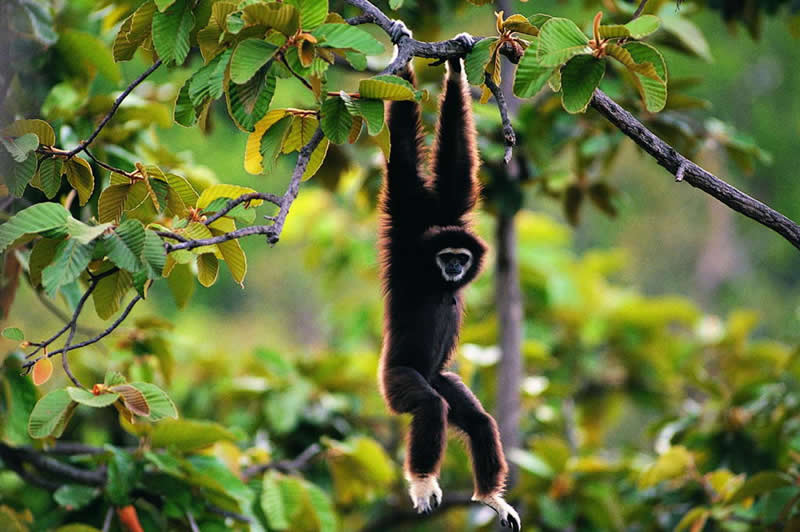But there was a problem.
但有個問題。
Other researchers protested that the... the opt-out response was simply a learned or conditioned response.
其他的研究人員提出抗議,認為這個選擇跳過的反應只是一種習得反應,或條件反應。
You remember intro to psychology, right?
你們還記得心理學概論對吧?
In other words, by pressing the pass paddle, the dolphin avoided having to wait and hasten the possibility of a food reward by moving directly to the next trial.
換句話說,通過按下“跳過”踏板,海豚避免了等待,還能增加得到食物獎勵的可能性,因為它能直接進入下一次測試。

So the experiment didn't necessarily indicate that the dolphin had knowledge of its own uncertainty, just that it wanted to avoid negative consequences.
所以這個實驗不一定證明了海豚知道自己的不確定,只知道海豚想避免消極后果罷了。
So more recently, our researcher and his colleagues devised a new study, this time using monkeys.
最近研究人員和他的同事設計了一個新的研究,這次他們用猴子(做實驗)。
In this experiment, the monkeys had to identify certain patterns displayed on a computer screen.
在這個試驗中,猴子需要辨別電腦屏幕上顯示的不同圖案。
These patterns were analogous to the tones used in the dolphin study.
這些圖案的作用類似于海豚研究中用到的音調。
One type of pattern was of a specific density and was to be classified as dense, while the second type of pattern could vary in density, but was always less dense than the first one.
一種圖案具有特定的密集度,被歸為“密集”類,另一類圖案的密集程度不同,但都比前一種的密集程度低。
And the monkeys' task was to identify this second type as sparse.
猴子要做的就是認出第二類是“稀疏的”。
So the denser the second type of pattern was, the more difficult the task became.
所以第二類圖案的密集程度越高,任務的難度越高。
And as in a previous study, the monkeys were given a third choice that would allow them to pass on to a new trial.
正如之前的研究一樣,猴子們也有第三種選擇,它們能跳過(這一輪)到下一次測試。
But unlike in the dolphin experiment, the monkeys had to complete four trials before they got any feedback.
但和海豚實驗不同的是,猴子要完成4個測試后才會得到反饋。
They didn't know if they responded correctly or incorrectly after each trial because there was no reward or punishment.
它們不知道自己回答得是否正確,因為實驗中沒有獎勵也沒有懲罰。
At the end of four trials, feedback was given.
4次測試結束后,才有反饋。
The monkeys received a food reward for each correct response, and a time-out during which a buzzer was sounded for each incorrect response.
猴子們在每次作答正確后會得到食物獎勵,錯誤則要被暫停作答,暫停期間會有蜂鳴器響起。
But the monkeys had no way to tell which reward or punishment was associated with which response.
但猴子們無法得知哪個獎勵或懲罰是對應哪次回答的。
And they didn't get either reward or punishment for choosing the pass option, the…um…the uncertainty response.
它們選擇“跳過”——不確定回答的話,既沒有獎勵也沒有懲罰。
But nevertheless they still chose this option in the appropriate circumstances when the trial was particularly difficult.
但無論如何,在測試特別難的時候,它們仍然會在合適的情況下選擇這一項。
And this is evidence that it wasn't a conditioned response, because that response didn't guarantee a faster reward.
這就證明了這種行為不是條件反應,因為這種反應不能保證更快的回報。
So what does all this tell us about animal consciousness or animals' awareness of themselves and their state of mind?
就動物自我意識即動物對心理活動的意識方面而言,這些都告訴了我們什么呢?
Can we really know what's going on in the minds of animals?
我們真的能知道動物腦子里都在想什么嗎?
No. Of course not.
不。當然不能。
But exploring the metacognitive capacity of animals could become an important criterion in highlighting the similarities and differences between human and animal minds.
但對動物元認知能力的探索也許能成為一條重要的標準,以強調人類思維和動物思維的異同之處。










